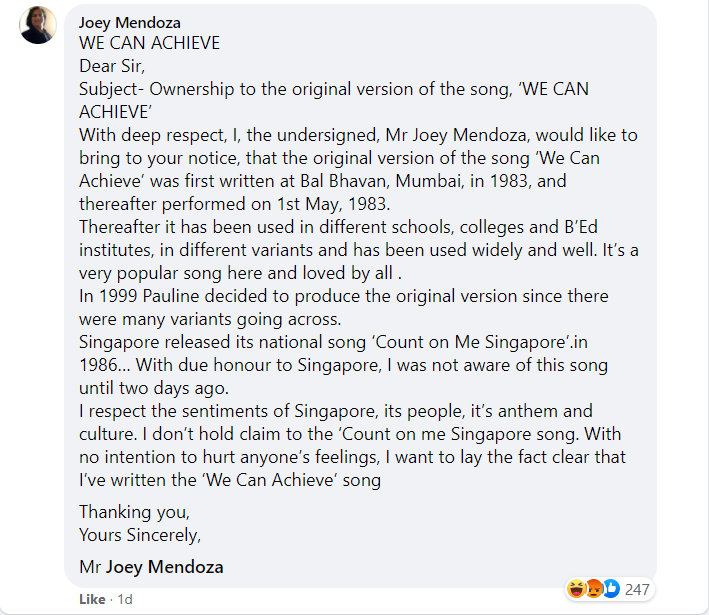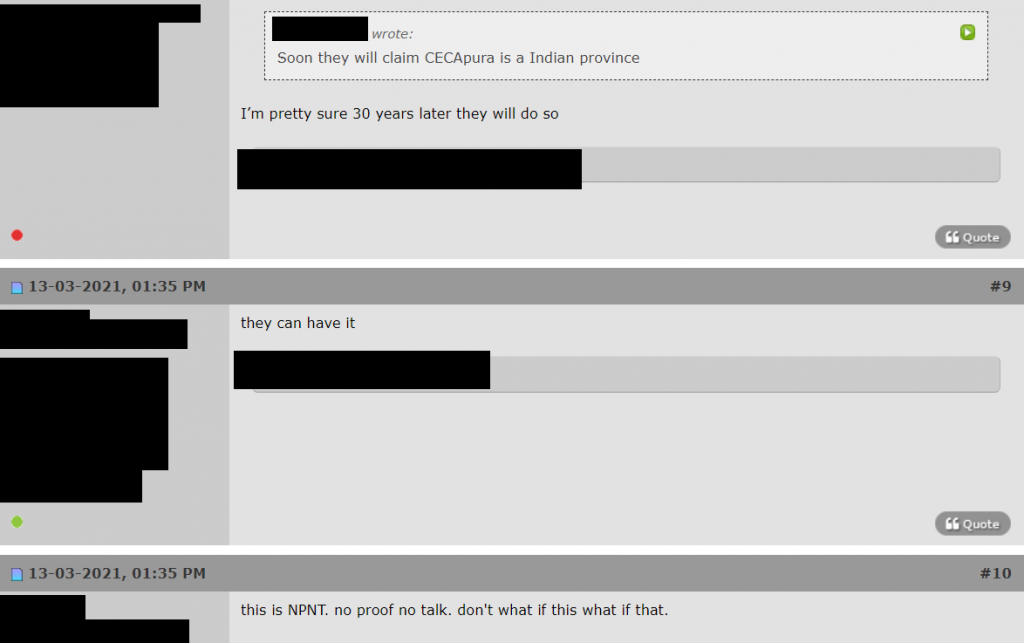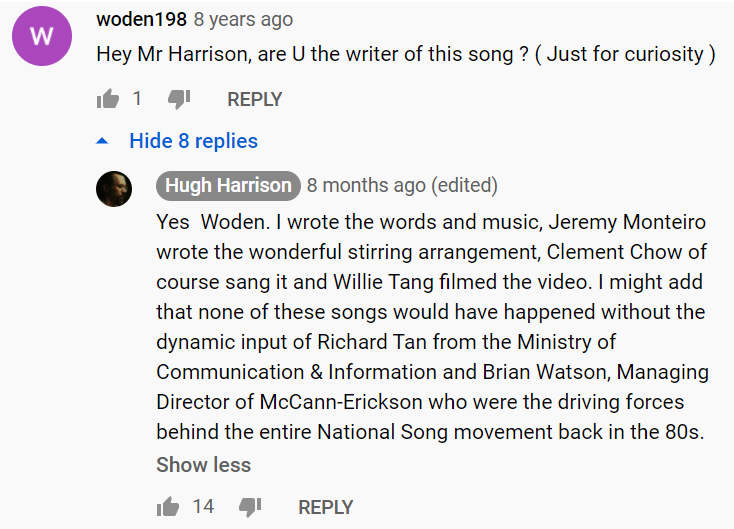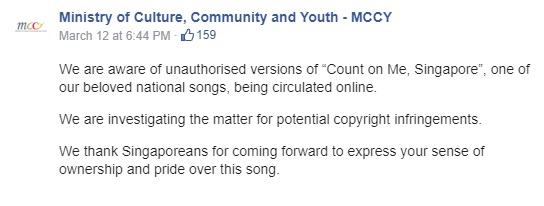You may have heard it from your family.
You may have heard it from your friends.
You may have even heard it from your India-based acquaintances, who claim to have heard “Count on Me, India” (aka “We Can Achieve”) first.
No matter which version you’ve heard, one thing’s for sure:
The whole “Count on Me, Singapore” vs “Count on Me, India” originality debate is real, and it’s happening right now, and you can count on me to summarise what’s happened so far.
Everything About the ‘Count on Me, S’pore’ Saga Whereby an India Composer Claims to Write It First
It all started with a viral music video, which has since been taken down by the original publisher, Pauline India.
However, you can watch a re-uploaded version down below:

So if you’ve noticed, the lyrics, musicality and tune all sound eerily similar to our own 1986 NDP classic “Count on Me, Singapore”, which we are all still singing during National Day every year as a student.
And so it’s little wonder why outcry and claims of plagiarism have emerged in the form of a tidal wave, enveloping the whole of Singapore and even reaching the shores of Pauline India themselves, who stepped out to clarify the source of the lyrics.
On 13 March, the publishing house released a Facebook post detailing that it had actually bought the copyright for the lyrics and music in 1999 from one particular Indian composer called Joey Mendoza.
Apparently, Mendoza claims to own the copyright to the music track.
Netizens alleged that the CD was sold for real cash and therefore was a commercial property.
There was some hoo-ha online about the supposed origin of the song, but finally, this was then expounded upon by the person himself, who stated that the song “We Can Achieve” had actually been performed in 1983, which is 3 years before the release of “Count on Me, Singapore”.

Now, here’s a disclaimer: there’s no evidence to prove that this Mr Joey Mendoza is the real Mr Joey Mendoza. Nor is there any evidence to show what he’s said is true. Heck, there’s also no evidence to prove that his Facebook account wasn’t hacked.
Expressing that the song had actually been used in different schools, colleges and B’Ed institutes since the performance, Mendoza stated that he was not aware of Singapore’s version until three days ago.
“I respect the sentiments of Singapore, its people, it’s anthem and culture,” he wrote. “I don’t hold claim to the ‘Count on me Singapore’ song. With no intention to hurt anyone’s feelings, I want to lay the fact clear that I’ve written the ‘We Can Achieve’ song.”
And yes, that’s when the saga started, and armchair detectives were commissioned.
Allegations
Netizens appear to be on the fence on this one, with some wondering nervously whether Singapore had actually been the one at fault all along.
It should be noted that many, however, doubted Mendoza’s claims.

Nevertheless, there is still a sense of suspicion, though their fears have been somewhat allayed by the original composer of “Count On Me, Singapore”, who has since provided his own stance on the topic.
Hugh Harrison‘s Alleged Response
The song “Count On Me, Singapore” is written by Hugh Harrison, a Canadian who worked in Singapore back then. Other than “Count On Me, Singapore”, the 70-year-old is also the brain behind other iconic songs like “Stand Up For Singapore” and “We Are Singapore”.
According to Harrison, who gave his take in a Youtube comment, the song had “evolved both lyrically and melodically over several months with input from both the government, the agency and the musical production team”.
The process was also “well documented”.
Now, do note once again that the response came from a YouTube comment, so there’s no evidence to prove it’s the real Hugh Harrison, or the account was hacked #justsaying
Harrison said that to put forth a product with multiple parties’ input and reach a stage similar to Mendoza’s version would be akin to being a “wild coincidence”, considering how “Count On Me, Singapore” did not exist before 1986.
In addition, Harrison also indicated a distinct difference between the lyrics of both songs.
In “Count On Me, Singapore”, the second verse goes: “There is something down the road that we can strive for/ We are told no dreams too bold that we can’t try for”.
Meanwhile, the Indian version reads: “We are told no dreams to hold that we can [strive] for”.
“From what I saw,” Harrison wrote, “Joey messed up when he transcribed the lyrics and wrote We are told no dreams to hold that we can try for.
“What does that mean? I guess you would have to ask Joey.”
It should be noted that Harrison had also clarified the exact amount of work that went into the song, in another Youtube comment dated some eight months ago.

Both Pauline India and Joey Mendoza have yet to respond to this latest development in the saga.
Composer Wrote to Pauline Communications and Joey Mendoza
In the latest update today (17 March), Harrison said in a YouTube comment that he has written to both Joey Mendoza and the executive of Pauline Communications in Mumbai “requesting that certain actions be taken to address Mr Mendoza’s false claims to be the original creator of this song.”

In a separate comment, he claimed that Mendoza’s claim has implied that Harrison copied the song instead, and that is a “direct attack” on Harrison’s integrity and professionalism. For that, he could be sued for slander and/or libel.
Heis now giving him an opportunity to rescind his claim.

Other Differences
Apart from the aforementioned differences, several Netizens have also pointed out how the intro and outro in the Indian version seem to differ from the centrepiece.

And while another admitted that Mendoza did have a song titled “We Can Achieve”, it was apparently not of the same tone.

In other news, the Ministry of Culture, Community and Youth (MCCY) has since responded to the matter.
Their first response was that they were aware of the matter and was investigating the case.

Later, they edited their response, stating that while it may be a copy, “imitation is sometimes the best form of flattery.
“We thank Singaporeans for coming forward to express your sense of pride in our national song,” they wrote. “It may be a copy of our song, but sometimes, imitation is the best form of flattery!”
It should be noted, however, that the response came before Mendoza took credit for the song.
You can verify the similarities for yourself down below:
Singapore’s 1986 version:
India’s version:
Featured Image: YouTube




